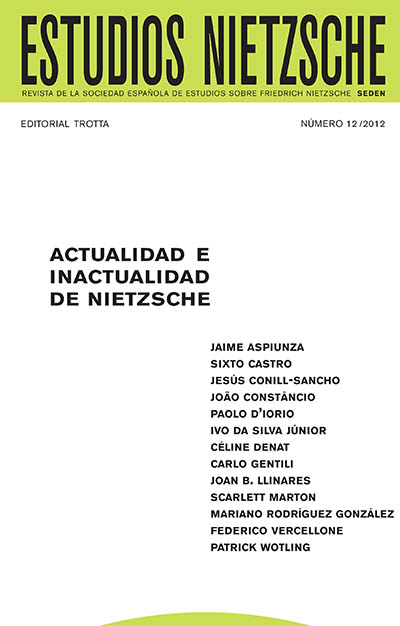Psychology lLessons: notes on the Nietzschean reading of Dostoyevski’s The Insulted and Injured
DOI:
https://doi.org/10.24310/EstudiosNIETen.vi12.10559Keywords:
art, artist, psycology, tragic artAbstract
This text, part of an extensive study on the Nietzschean reading of The Insulted and Injured by Dostoevsky, begins with a reflection on the currency of the analysis of the relations between both authors, as a challenge that remains open in the ‘Nietzsche-Forschung’. From the documents we testify that reading and its effects («mit dem grössten Respekt vor dem Künstler Dostoiewsky») there is evidence to clarify the artist’s concep-
tion shown here. Nietzsche’s letters show, moreover, that the philosopher praised the Russian writer especially as psychologist, and this is the second issue we want to explain. The texts on Dostoevsky by E. M. Vogüé, most likely read by Nietzsche, highlight three aspects which consolidate our analysis: the tragic art of the novelist, the peculiar philosophical mood traits of Humiliés et offensés, that make this book a predecessor of The Idiot and, consequently, a source of The Antichrist.
Downloads
Metrics
References
Bourget, P., Un crime d'amour, Paris: A. Lemerre, 1886.
Campioni, G., Nietzsche y el espíritu latino, trad. y prólogo de Sergio Sánchez, Buenos Aires: El cuenco de plata, 2004.
Campioni, G., Nietzsche y el espíritu latino. trad. y prólogo de Sergio Sanchez, Buenos Aires: El cuenco de plata, 2004.
Dostoievski, F., Cartas a Misha [1838-1864], Barcelona: Grijalbo-Mondadori, 1995.
Dostoievski, F., Humiliés et offensés, trad. de E. Humbert, Paris: Librairie Plon, 1884.
Dostoievski, F., Humillados y ofendidos, trad. de V. Andresco, Madrid: Alianza, 2011.
Dostoievski, F., Obras Completas de Dostoievski, trad. de de Augusto Vidal y Luis Abollado, Barcelona: Vergara, 1969.
Frank, J., Dostoievski. La secuela de la liberación, 1860-1865 (1986), trad. de J. J. Utrilla, México: FCE, 1993.
Grossman, L., Dostoievski, trad. de M. Kahn, Paris: Parangon, 2003.
Llinares, J. B., «La intensa relación de Nietzsche con Dostoievski»: La Torre del Virrey 69 (verano de 2009), pp. 1-8.
Llinares, J. B., ?Antropologia filosofica i literatura: la lectura nietzscheana d’Apunts del subsòl de F. Dostoievski?: Quaderns de Filosofia i Ciència 38 (2008), 41-58.
Llinares, J. B., ?Nietzsche descubre a Dostoievski. Notas sobre la lectura nietzscheana de La patrona?, en Estudios Nietzsche 9 (2009), 67-90.
Nietzsche, F., Obras Completas, I-IV (OC ). Director ed. Diego Sánchez Meca. Madrid: Tecnos, 2011-2016
Nietzsche, F., Correspondencia I-VI. (CO). Director ed. Luis E. de Santiago Guervós. Madrid : Trotta, 2005- 2012.
Nietzsche, F., Fragmentos Póstumos I-IV (FP). Director ed. Diego Sánchez Meca. Madrid: Tecnos, 2006-2010.
Steines, G., Tolstoi o Dostoievski (1959), trad. de A. Bartra, México: Era, 1968.
Stellino, P., «Ein Vergleich zwischen Nietzsches Der Antichrist und Dostojewskijs Der Idiot», en Nietzscheforschung 14 (2007), 203-210.
Volpi , F., «Le nihilisme comme logique de la décadence: Nietzsche lecteur de Bourget», en Jean-Frangois Mattéi, Nietzsche et le temps des nihilismes, Paris: PUF, 2005, pp. 97-119.
Downloads
Published
How to Cite
Issue
Section
License
As of issue 21 (2021) this journal is published only in open access (diamond route).
From that number 21, like the previous numbers published in NIETZSCHE STUDIES, they are subject to the Creative Commons Acknowledgment-NoComercia-ShareIgual 4.0 license, the full text of which can be consulted at <http://creativecommons.org/licenses/by-nc-sa/4.0 >
It is the responsibility of the authors to obtain the necessary permissions of the images that are subject to copyright.
This work is licensed under a Creative Commons Attribution-NonCommercial-ShareAlike 4.0 International License.
Copyright generates two different rights: moral rights and patrimonial rights that EJFB recognizes and respects. Moral rights are those relating to the recognition of the authorship. They are rights of a personal nature that are perpetual, inalienable, unseizable and imprescriptible as consequence of the indivisible union of the author and his/her work.
Patrimonial rights are those that can be derived from the reproduction, distribution, adaptation or communication of the work, among others.







11.png)
